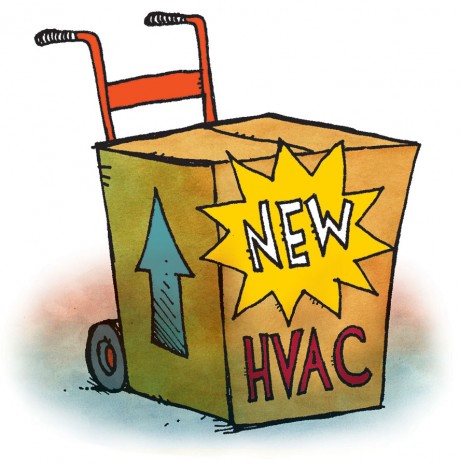3: Replace your HVAC system
By Diane Veto Parham | Illustrations by David Clark

Cost: Ranges from a few thousand dollars for a single-zone, mini-split system up to tens of thousands to install a geothermal system.
Benefit: Upgrading to Energy Star® certified heating and cooling equipment can deliver annual energy-bill savings of 10 to 30 percent, according to the Department of Energy; geothermal systems can cut energy use for heating and cooling by 25 to 50 percent.
DIY potential: You’ll need a trained professional to properly size and install a system for your needs.
Heating and cooling account for about half of typical household energy costs. Minimize those expenses by upgrading to a more efficient system when your current unit ages out. Expect an HVAC system to last, on average, about 10 to 12 years.
Air-source heat pumps, which draw heat from the air and move it indoors or outdoors as needed, provide efficient heating and cooling from a single unit. Traditionally more popular in milder climates, the older models relied on inefficient backup heating, such as heat strips, when outside temperatures dropped below 40 degrees. But heat pumps have evolved, says Rick Nortz, manager of utility and efficiency programs for Mitsubishi Electric Cooling and Heating.
“The old view of heat pumps was that they don’t work below freezing,” he says. Many modern heat pumps, he says, are designed to be efficient heat sources down to 5 degrees.
For the coldest regions, where a backup heating system is desired, a dual-fuel heat pump can offer auxiliary heat powered by natural gas or propane.
Mini-split heat pumps — highly efficient ductless systems that can be placed where needed in a home — are growing in popularity. They work well for add-on rooms that aren’t connected to existing ductwork or for rooms that stay hotter or colder than the rest of the house. Multi-zone mini-split systems allow different rooms to be set at their own comfort levels, Nortz says.
“That room becomes its own home, with its own thermostat,” he says. And because there are no ducts, there’s no energy lost through leaky ductwork.
Ground-source (geothermal) heat pumps are the most efficient, albeit more expensive, heating-and-cooling option. Drawing heat from stable ground temperatures rather than fluctuating air temperatures, geothermal heat pumps use about 25 to 50 percent less electricity than conventional HVAC systems.
For any heating-and-cooling system, proper installation is essential to reap full benefits of energy-efficient performance. A certified HVAC contractor will do a load calculation to determine what size HVAC unit is right for your house and whether any special adjustments are necessary for your location.
-
Share this story:

